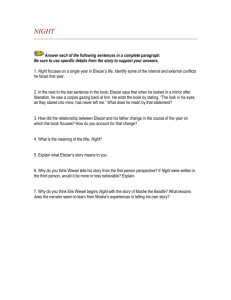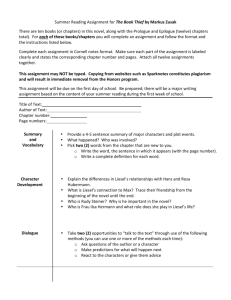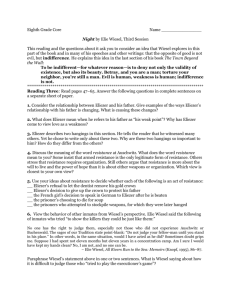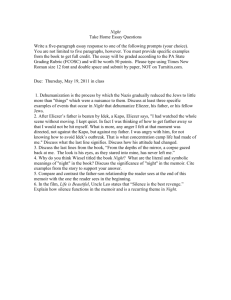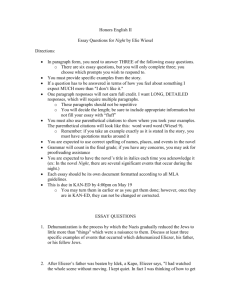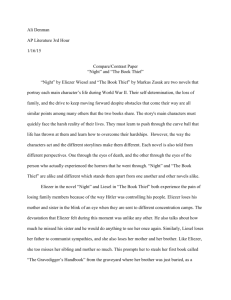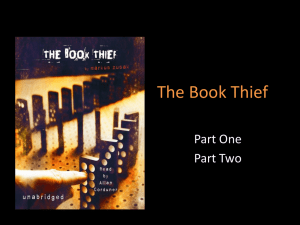Place Handout Title Here - Padua Franciscan High School
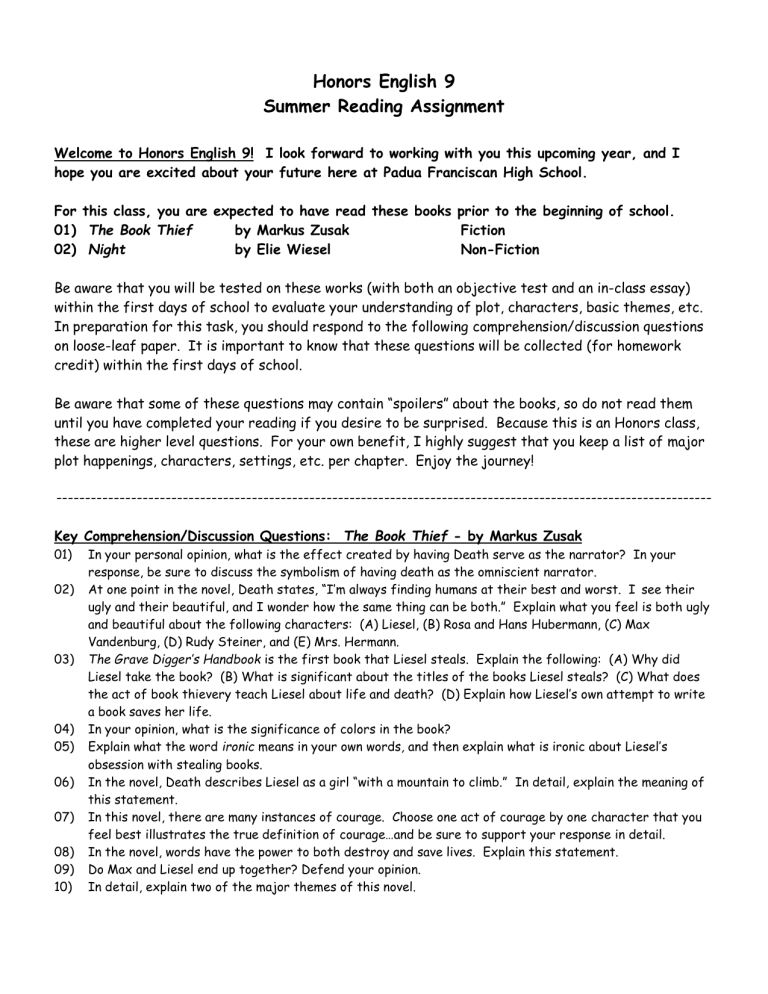
Honors English 9
Summer Reading Assignment
Welcome to Honors English 9! I look forward to working with you this upcoming year, and I hope you are excited about your future here at Padua Franciscan High School.
For this class, you are expected to have read these books prior to the beginning of school.
01) The Book Thief
02) Night by Markus Zusak by Elie Wiesel
Fiction
Non-Fiction
Be aware that you will be tested on these works (with both an objective test and an in-class essay) within the first days of school to evaluate your understanding of plot, characters, basic themes, etc.
In preparation for this task, you should respond to the following comprehension/discussion questions on loose-leaf paper. It is important to know that these questions will be collected (for homework credit) within the first days of school.
Be aware that some of these questions may contain “spoilers” about the books, so do not read them until you have completed your reading if you desire to be surprised. Because this is an Honors class, these are higher level questions. For your own benefit, I highly suggest that you keep a list of major plot happenings, characters, settings, etc. per chapter. Enjoy the journey!
------------------------------------------------------------------------------------------------------------------
Key Comprehension/Discussion Questions: The Book Thief - by Markus Zusak
01) In your personal opinion, what is the effect created by having Death serve as the narrator? In your response, be sure to discuss the symbolism of having death as the omniscient narrator.
02) At one point in the novel, Death states, “I’m always finding humans at their best and worst. I see their ugly and their beautiful, and I wonder how the same thing can be both.” Explain what you feel is both ugly and beautiful about the following characters: (A) Liesel, (B) Rosa and Hans Hubermann, (C) Max
Vandenburg, (D) Rudy Steiner, and (E) Mrs. Hermann.
03) The Grave Digger’s Handbook is the first book that Liesel steals. Explain the following: (A) Why did
Liesel take the book? (B) What is significant about the titles of the books Liesel steals? (C) What does the act of book thievery teach Liesel about life and death? (D) Explain how Liesel’s own attempt to write a book saves her life.
04) In your opinion, what is the significance of colors in the book?
05) Explain what the word ironic means in your own words, and then explain what is ironic about Liesel’s obsession with stealing books.
06) In the novel, Death describes Liesel as a girl “with a mountain to climb.” In detail, explain the meaning of this statement.
07) In this novel, there are many instances of courage. Choose one act of courage by one character that you feel best illustrates the true definition of courage…and be sure to support your response in detail.
08) In the novel, words have the power to both destroy and save lives. Explain this statement.
09) Do Max and Liesel end up together? Defend your opinion.
10) In detail, explain two of the major themes of this novel.
Key Comprehension/Discussion Questions: Night - by Elie Wiesel
01) Consider Eliezer’s feelings for his family, especially his father. What about his father’s character or place in the Jewish community of Sighet commands Eliezer’s respect or admiration?
02) Wiesel writes, “Then one day they expelled all the foreign Jews from Sighet. And Moche the Beadle was a foreigner.” Why does Wiesel choose to deliver this shocking information so matter-of-factly? What is the point/purpose of his abrupt manner?
03) Consider the manner in which Moche is treated by the Jews of Sighet after he has escaped the Gestapo’s capture. Discuss whether or not the people are happy to see him, and if he himself is happy to be alive.
Also explain why Moche has returned to the village and why the Jewish townspeople don’t believe the horrible news he brings back to them.
04) Time and time again, the people of Sighet doubt the advance of the German army. Psychologically analyze what might be the reasons for the townspeople’s widespread denial of the evidence in front of them.
05) Not long after arriving at Birkenau, Eliezer and his father experience the horrors of the crematory first- hand, and they are nearly killed themselves. Discuss Eliezer’s physical, mental, and emotional reactions to this hellish and inexplicable experience. Explain how the story of Night changes at this point as well as how Wiesel himself changes.
06) Consider the inscription that appears above the entrance to Auschwitz. What is it supposed to mean, and what has this slogan come to mean to Eliezer?
07) Explain a bit about Eliezer’s ongoing crisis of faith throughout the memoir. If you do not already know about the character of Job in the bible, do a bit of research, and then explain how Eliezer feels connected to Job. How do Eliezer’s thoughts and feelings change once he has identified with Job while in
Auschwitz? From this analysis, discuss the relationship that Wiesel has with God throughout Night.
08) Describe the relationships that Eliezer has with both Akimbo Drummer and Julie. How do their respective deaths affect Eliezer? What do each of these people mean to him?
09) As the memoir progresses, we witness instances where the Jews have been reduced to acting - and even treating their fellow prisoners like animals. Explain two of the horrific acts that occur to support this statement. Explain and analyze what you feel leads people to such horrific behavior. Do you feel such behavior is inevitable under such circumstances?
10) In the concluding pages of Night, Eliezer’s father is dying a slow, painful death in Buchenwald. Does
Eliezer see his father as a burden by this point, or does he feel only pity and sorrow for him? Compare and contrast the father-son relationship you see at the end of the memoir with the one you see at the beginning.
